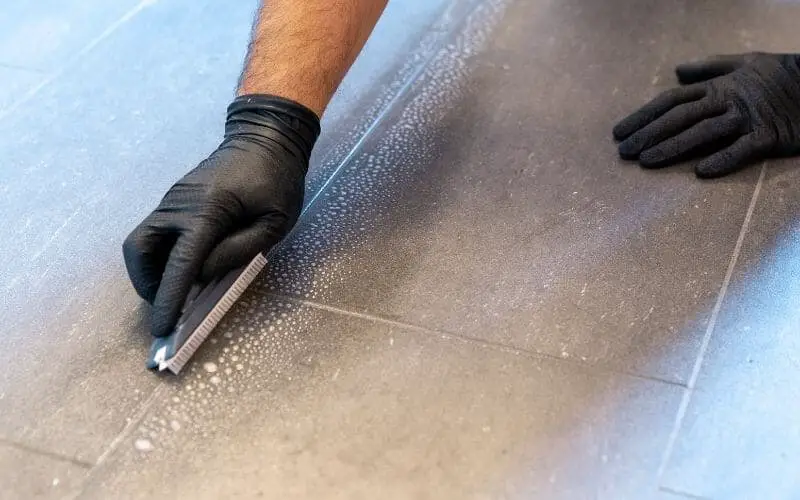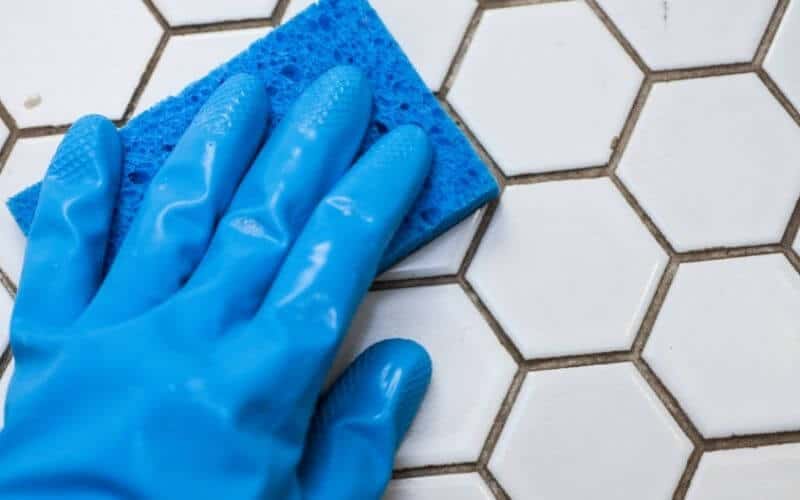Why are most homeowners gearing towards tile floorings? Well, for one, tile is beautiful, durable, and generally easy to clean. While cleaning tiles is quite easy, the same cannot be said for grout.
The porous composition of grout makes it prone to stains and discolorations. You can spend hours on your knee scrubbing grout lines with no visible results.
A simple and easy way might seem like using bleach to clean grout. And this is exactly why we are interested in the safety of bleach on grout.
Bleach should be used minimally on grouts as bleach is corrosive and can cause permanent damage to your grout.
This post will discuss safe ways of using bleach on grout.
Read: How to clean grout without scrubbing
Can You Use Bleach On Grout?
Table of Contents
As mentioned earlier, while bleach can be used on grout, it should be used minimally to avoid permanent damage.
It is common for most homeowners to use high-powered cleaning solutions, such as Clorox, on their grout line. While bleach will likely get the stain out of your grout, using it daily for grout cleaning will not rid your grout of mold.
So, while bleach might effectively get the stains away, it only gives you a false sense of security since it is ineffective in killing mold.
According to the Environmental Protection Agency (EPA), the use of bleach on tiles emits fumes that can produce health issues for users like respiratory impairment, asthma, and allergies. Also, exposure to bleach may cause burning of the eyes, nose, and throat.
Now you know that using bleach on grout lines might not be so advisable. We recommend you try out some DIY grout cleaner. For instance, a baking soda and peroxide mixture can be effective in cleaning discolored tiles.
To make this mixture, combine baking soda, peroxide, and dish soap in a bowl. Mix thoroughly and spread onto the stained grout.
Allow the mixture to sit at least ten minutes, then wipe with a damp cloth or mop. Alternatively, you can use a hard bristle brush to scrub the mixture on the grout lines.
Also, you should consider sealing and repainting your grout lines if all the methods known to you fail to work.
Tips on using Bleach on Grout
While we have acknowledged that using bleach on grout lines may not be the best line of action, if you must use bleach on tiles, you should follow the necessary safety precautions:
1. Wear Safety Gear
As mentioned, bleach is highly corrosive. It follows that necessary precautions must be adopted when using bleach on tiles.
Always put on protection gears like safety glasses, rubber gloves, and old clothes that you don’t mind damaging with bleach stains.
2. Make Sure that the Space is Properly Ventilated
It spells danger using bleach in an enclosed space without proper ventilation. This is because bleach is toxic and releases noxious fumes, which can make you nauseous in an enclosed space. Ensure that all the windows are open and, if possible, turn on a fan to aid proper ventilation.
3. Don’t Leave Bleach Sitting on Grout Lines for too Long
Pour diluted bleach all over the tiles; it is recommended that ¾ cup of bleach be diluted with 1 gallon of water. Allow the bleach to sit for at most 5 minutes and scrub off gently with a toothbrush.
You mustn’t leave the bleach on the tile too long. Bleach is corrosive and can cause permanent damage to your grout the longer you leave it.
4. Rinse the Tiles After Using Bleach
You don’t want to leave any remnant of bleach on your grout. Make sure to rinse the tile thoroughly with clean water after using bleach. Keep on rinsing until bleach is removed from your tiles. After rinsing off the bleach, use a dry rag to dry the surface.
Dangers of Using Bleach on Grout
While we have highlighted some downsides of using bleach on tiles, it’s time we go for a more in-depth conversation on the use of bleach on grout.
1. Bleach Doesn’t Clean Mold
As mentioned earlier, bleach gives you a false sense of insecurity, and it’s incapable of killing the molds and mildew that has been growing on your grout lines over time.
2. Bleach is Extremely Caustic
You really shouldn’t mess around with bleach. A small amount of bleach on your skin can lead to severe rashes, burns, and other skin ailments.
More so, if you are allergic to certain chemicals, this spells out more problems for you. A simple task of cleaning your grout lines might land you in the ER if proper care is not taken.
Moreover, if you have kids or pets in your home, you’re also putting their health at risk each time you bring out the bleach to clean your grout.
3. Bleach is Corrosive to Metals
A little drop of bleach on a metal fixture when cleaning grout might not have such a beautiful ending for the fixture.
The metal reacts negatively to bleach, and a little drop of bleach on it will lead to corrosion and rust of such metal. If care is not taken, a simple grout cleaning task will have you replacing metal fixtures in your home.
4. Bleach Becomes Less Effective After Long Usage
The first time using bleach on your grout lines will give it a beautiful sparkle; after some time, you might notice that it is not quite as effective.
Why is that? Bleach is easily diluted by just about anything, and with time, it stops being effective.
5. Bleach can Damage Protective Coating of Tiles
You might find yourself having to seal your tiles after the frequent use of bleach on it. Ceramic and porcelain tiles do not need sealing (unless they are unglazed).
What bleach does is that it destroys the protective coating of these tiles, including tile finishes, until nothing is left of your tiles and grout.
Read: How to seal tile floors
Will Bleach Damage Ceramic Tile?
Yes. Frequent use of bleach on ceramic tiles will damage them. As examined above, bleach destroys the protective coating of ceramic tiles, including tile finishes, until nothing is left of your tiles and grout.
Read: Does ceramic tile need to be sealed
Conclusion
The question presents itself again, can you use bleach on grout? Now you know that while bleach can be used on grout, it should be used minimally to prevent damage. We recommend you go for homemade grout cleaners like the baking soda and peroxide mixture discussed above.

